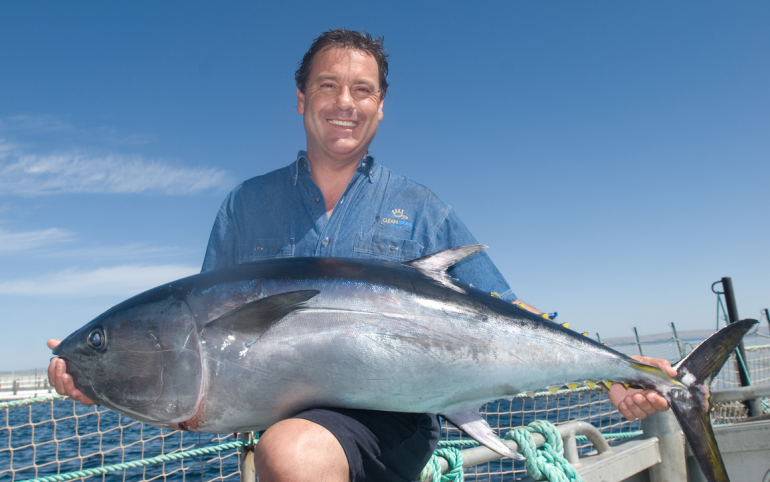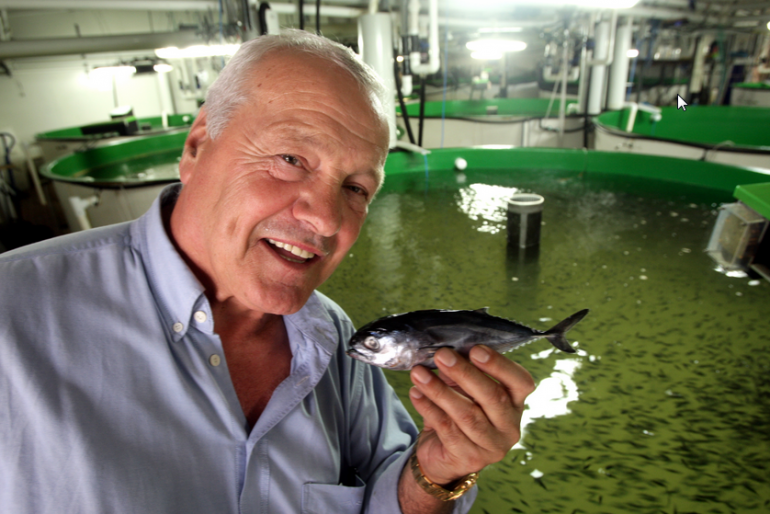Fishing for success in a sea of challenges
When Prince Charles and the Duchess of Cornwall visited Australia in 2012, they were treated with sashimi made from a 40-kilogram southern bluefin tuna donated by Port Lincoln fishing baron Hagen Stehr AO.
Adelaide celebrity chef Simon Bryant, who served the royal couple, said he was in awe of the southern bluefin tuna but at the same time was concerned about the fate of the species due to the world’s appetite for it.
The future king of England and Australia said: “that is a very valuable thing,” according to the Adelaide Review. Bryant said: “I have no doubt that the inference was on the future of the species and I do have enough faith in the boys in Lincoln that we don’t let the future king down.”
The “boys in Lincoln” that the chef referred to are the Stehr family, arguably Australia’s most influential fishing dynasty. The reason they may not disappoint their future sovereign is the fact that they have made a historic breakthrough in breeding southern bluefin tuna in captivity.
Fishing history was made on March 22, 2009, when a tankful of bluefin tuna began to spawn for the first time under controlled conditions. It was a major step towards realising the Stehr family’s dream of breeding the notoriously fussy tuna in tanks.

Marcus Stehr
The population of bluefin tuna has plummeted more than 90 per cent since the 1950s, according to Times magazine. It named the tank-bred tuna as one of the top 50 inventions in 2009.
The Stehr family business started in the early 1950s when Hagen Stehr, the family patriarch, landed in Port Lincoln, South Australia, as a seaman on a German trading ship. He fell in love with a local girl, Anna, who worked as a clerk at the local court house.
“He took a liking to her and Port Lincoln,” said Marcus Stehr, Hagen’s son and heir to the family fortune. Hagen became a sailor because he dropped out of Germany’s academically challenging high school system and also because he was used to being on the water.
He became an abalone diver to start off with and he took a job as a road worker until he obtained his own abalone licence. He slowly but gradually upgraded his prawn boat, which he named Santa Anna after a port in South America as well as his wife, to a fleet of tuna-fishing boats.
Want more Family Business stories like this? Sign up for our free weekly newsletter
The business took off when the Stehrs realised there was a real consumer market for the tuna in Japan. “We knew the Japanese like tuna, like to eat raw sashimi meat and we knew they would pay a high premium price for it,” said Marcus, the managing director of the Stehr group.
Given the dwindling stock of wild southern bluefin tuna, the Stehrs want to develop a sustainable business model. “Part of our vision was the diversification into a fully-blown aquaculture industry from eggs to plates, to complete the full life-cycle of southern bluefin tuna,” he says.
The breeding of the regal, predatory fish prized for their buttery sashimi meat was putting a lot of financial pressure on the Stehrs, especially at a time when the exchange rate was weak and the price was declining. As a result, they decided to float the company in 2005 and called it Clean Seas Tuna.
Despite their initial technical breakthrough, the venture has been a financial drain. “We did have a lot of successes to start off with,” Marcus says, “there were a hell of a lot of firsts. We were the first company that has ever done it and no other company has ever tried it.”

Hagen Stehr AO
But the bottleneck is to get fertilised eggs into fingerlings, and there is a lot of cannibalism in the tank. Though they get satisfactory results from time to time, it's not consistent enough to turn it into a full-blown commercial project, so the Stehrs have decided to focus on other businesses such as catching and breeding kingfish.
They are still devoting part of their revenue to research and development, hoping to turn their breeding program into a commercial success one day.
Though the Stehr family fortune owes a lot to demand from the Japanese market, Marcus is concerned that they are losing their premium place in Japan and the exchange rate is working against them. “We have been selling our southern bluefin tuna for many years. As a result of that, Japan has taken advantage of us,” he says.
Marcus wants to find a new market.
Like many other Australian industries, the answer is China. “If this fishing industry and we as a group are not prepared to adapt or diversify when we need to, we will get [left] behind,” he says. “We have to diversify into China. It is not a choice; it is something that needs to be done.”
The family is also considering inviting Chinese investors to take part in the business for the first time in its history. Marcus wants to have a partner, ideally a family business with similar values and succession planning.
A third generation of Stehrs is being trained to succeed the business. Marcus’ eldest son is taking a master class in sailing and his younger son is doing a business degree.
In the end, Marcus pays tribute to his mother Anna and says she is the force that's holding the family together. "If it wasn’t for her, none of this would be possible," he says. "Like all other families, you never agree on everything, do you? There is a bit of bloody interfamily rivalry."
"She keeps the peace."
















